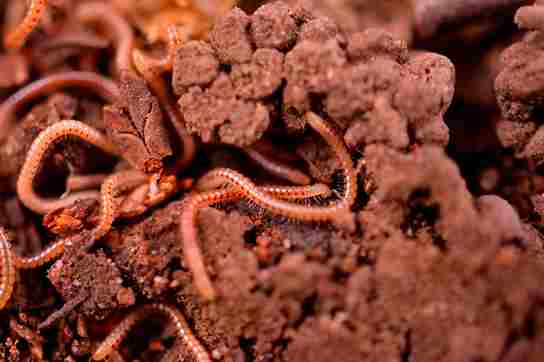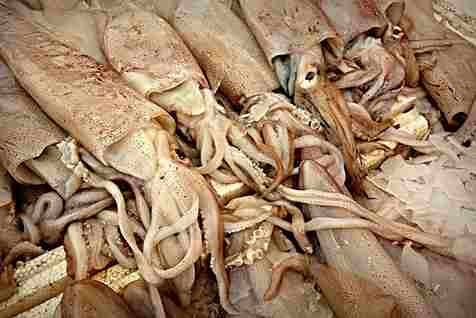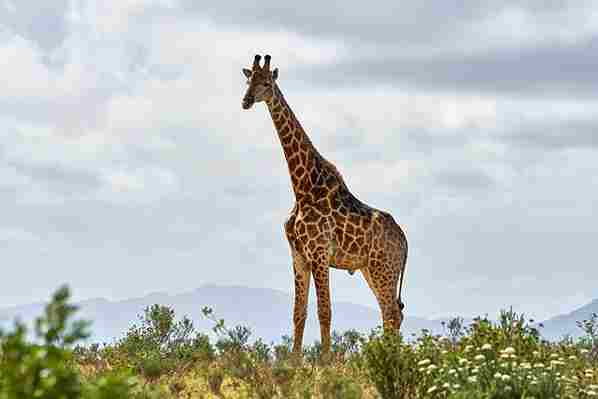Are Worms Decomposers? (EXPLAINED)
Yes, worms are decomposers. They feed on dead organic matter, such as plants and animals, as well as detritus.
The role of decomposers is to break down matter (usually dead plants and animals). This activity causes nutrients to be released to plants, which are the primary producers. As you can see, decomposers play a very important role in the ecosystem and survival of living organisms.

What Are Decomposers?
Have you ever thought about what would happen if every dead organic matter remained as it is with no decomposition taking place? Well, it means all plants would die since they get their nutrients from decomposed matter. If all plants were to die, then all animals would eventually die, and there would be no life on earth.
I thought I should give you that little background so you will know the vital role decomposers play on the earth and in the food web. They are essentially responsible for the flow of energy in the ecosystem.
So, what are decomposers?
Decomposers are living organisms that derive energy by feeding on dead plants and animals. They also break down the waste of other animals. They mainly consist of fungi, bacteria, and invertebrates – FBI.
I will also include protozoa, which, together with bacteria, are too small to be seen with the naked eye. In contrast, you don’t need a microscope to notice a fungus. Besides smaller organisms, other animals that also play a role in the decomposition process include ants, slugs, snails, flies, beetles, and many more.
READ MORE: Are Snails Decomposers?
The Role Of Decomposers In The Ecosystem
As earlier indicated, decomposers break down dead organic matter into simpler inorganic matter, which is returned to the soil as nutrients and used by plants.
Plants are the primary producers.
One thing most decomposers have in common is that they are small in size.
It is worth mentioning that the primary function of decomposers in the ecosystem is that of maintaining and recycling dead matter. In other words, if there were no decomposers to break down organic matter, the earth would become a huge dumpsite, and dead matter would remain as they are, and no nutrients would be available for plants. This, in turn, will translate to no food for animals, which will eventually lead to the total collapse of the ecosystem.
So, decomposers form the last link in the food chain, and their activities help to maintain balance in the ecosystem.
What Are Consumers?
Consumers, as their name suggests, are simply organisms that survive by feeding on or consuming other organisms.
In other words, they cannot make their own food and have to rely on other organisms, which could be plants or animals or both. They are also called heterotrophs. A good example of a consumer is a human being.
Consumers can be divided into three main categories based on the source of their food. These include primary consumers, secondary consumers, and tertiary consumers.
Primary consumers are animals that feed on just plants. They are also regarded as herbivores and include both small and large animals, such as squirrels, goats, sheep, cows, and buffalos.
Secondary consumers consist of animals that feed on other animals, usually primary consumers or herbivores. These include carnivores (animals that eat only meat, such as lions and wolves) and omnivores (animals that feed on both meat and plants, such as dogs, bears, and pigs.
Tertiary consumers have a diet that consists of primary and secondary consumers. These are usually large and apex creatures such as sharks, whales, crocodiles and humans.
Why Are Worms Decomposers And Consumers?
Having gone through what a consumer and a decomposer is, we can conclude that worms are both consumers and decomposers. Let’s see why this is so:
Worms As Decomposers
As I pointed out earlier, worms are natural decomposers and that is because they feed on dead organisms. They help to break down these organisms into simpler materials that are absorbed by plants as nutrients. This helps to maintain the flow of energy through the ecosystem.
Like most invertebrates, worms are usually very small, and their size helps them in breaking down larger organic matter.
Worms As Consumers
Besides feeding on dead matter, worms also eat plants, especially vegetables and fruits. This makes them primary consumers.
Primary consumers are not capable of producing their food; instead, they feed on organisms that produce the food.
Most composting worms like to eat any member of the Cucurbitaceae family, such as cantaloupe, watermelon, pumpkin, honeydew, and squash.
Worms are generally attracted to rotten vegetation. Besides plants, they may also eat other tiny animals in the soil, such as nematodes.
Overall, a worm’s diet includes dead matter (decaying animals and plants), living plants, fungi and bacteria, animal poop, and other tiny animals in the soil.
Are worms detritivores?
Yes, worms are detritivores. Detritivores are a class of decomposers that feed on detritus. Detritus is simply a decaying plant or animal.
In general, there are three types or classes of decomposers. These include detritivores, saprophytes, and scavengers.
Worms are detritivores, as indicated above. Other animals in this class include sea stars, beetles, termites, and millipedes.
Saprophytes are also decomposers, and they feed on dead or decaying organic matter. The major difference between them and detritivores is that while detritivores have to seek out their food, saprophytes live and feed on dead matter.
Scavengers also feed on decaying matter, such as meat or a rotting plant; however, unlike detritivores and saprophytes, they are considerably bigger and feed on a large scale.
At this point, I would like to point out that detritivores are not the main or “true” decomposers, even though they also play an important role in the decomposition process. Bacteria, fungi, and protozoa are the main decomposers. Detritivores help to expose more of the decaying material so they can be broken down by the main decomposers.
Another key difference is that while the main decomposers can absorb nutrients through extracellular digestion, detritivores have to ingest theirs orally.
Other Related Questions About Worms And Decomposers
Are earthworms decomposers?
Yes, earthworms are indeed decomposers as well as detritivores. They feed on and extract energy from dead or decaying matter.
Are worms producers?
Worms are not producers. They cannot make their own food but instead have to rely on the primary producers or plants. They do not have chlorophyll and other cell organs required for photosynthesis.
Are worms scavengers?
Worms are technically detritivores but can also be regarded as scavengers since they feed on dead plants. “Scavenger” is mostly used to describe larger animals such as vultures, coyotes, and jackals.
Are snails herbivores?
Worms are best described as omnivores. This is because, although they mostly eat plant material, they can also consume microscopic animals in the soil or dirt, such as nematodes.
READ MORE: Do Spiders Eat Caterpillars?






